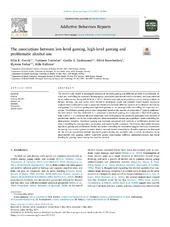| dc.contributor.author | Erevik, Eilin K. | |
| dc.contributor.author | Torsheim, Torbjørn | |
| dc.contributor.author | Andreassen, Cecilie Schou | |
| dc.contributor.author | Krossbakken, Elfrid | |
| dc.contributor.author | Vedaa, Øystein | |
| dc.contributor.author | Pallesen, Ståle | |
| dc.date.accessioned | 2019-08-22T12:04:13Z | |
| dc.date.available | 2019-08-22T12:04:13Z | |
| dc.date.issued | 2019-12 | |
| dc.Published | Erevik Eilin K., Torsheim T, Andreassen CS, Krossbakken E, Vedaa Ø, Pallesen S. The associations between low-level gaming, high-level gaming and problematic alcohol use. Addictive Behaviors Reports. 2019;10:100186 | eng |
| dc.identifier.issn | 2352-8532 | |
| dc.identifier.uri | https://hdl.handle.net/1956/20704 | |
| dc.description.abstract | The current study aimed to investigate associations between gaming and different patterns of problematic alcohol use, controlling for important demographics, personality and mental health covariates. Data was collected by an online survey during fall 2016 (N = 5217). Students who had participated in a survey among students in Bergen, Norway, one year earlier were invited to participate. Crude and adjusted binary logistic regression analyses were conducted in order to assess the relationship between different patterns of problematic alcohol use and gaming (i.e. low-level gaming and high-level gaming vs. no gaming) while controlling for important covariates. The different gaming groups were categorised based on the number of symptoms of “gaming addiction” (in total seven) that they endorsed: 4 > symptoms = low-level gaming, 4 ≤ symptoms = high-level gaming. Only 0.2% (n = 11) endorsed all seven symptoms. Low-level gaming was positively associated with patterns of problematic alcohol use in the crude analyses; these associations became non-significant when controlling for demographic variables. High-level gaming was inversely associated with patterns of problematic alcohol use when controlling for demographics, personality, and mental health covariates. The inverse relationship between high-level gaming and problematic alcohol use (when controlling for covariates) suggest that heavy investment in gaming may protect against excessive alcohol use and alcohol-related harm. Possible explanations discussed for the inverse associations include high-level gamers having less available time to drink, intoxication being incompatible with gaming, and/or high-level gamers experiencing sufficient satisfaction/escape and social bonding by gaming, hence having less need for alcohol. | en_US |
| dc.language.iso | eng | eng |
| dc.publisher | Elsevier | eng |
| dc.rights | Attribution CC BY | eng |
| dc.rights.uri | http://creativecommons.org/licenses/by/4.0/ | eng |
| dc.subject | Gaming | eng |
| dc.subject | Gaming disorder | eng |
| dc.subject | Alcohol use | eng |
| dc.subject | Students | eng |
| dc.subject | Personality | eng |
| dc.subject | Mental health | eng |
| dc.title | The associations between low-level gaming, high-level gaming and problematic alcohol use | eng |
| dc.type | Peer reviewed | |
| dc.type | Journal article | |
| dc.date.updated | 2019-06-18T10:05:13Z | |
| dc.description.version | publishedVersion | |
| dc.rights.holder | Copyright 2019 The Author(s) | eng |
| dc.identifier.doi | https://doi.org/10.1016/j.abrep.2019.100186 | |
| dc.identifier.cristin | 1698571 | |
| dc.source.journal | Addictive Behaviors Reports | |

